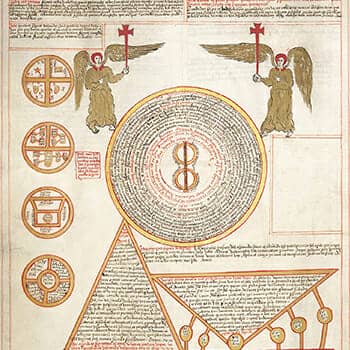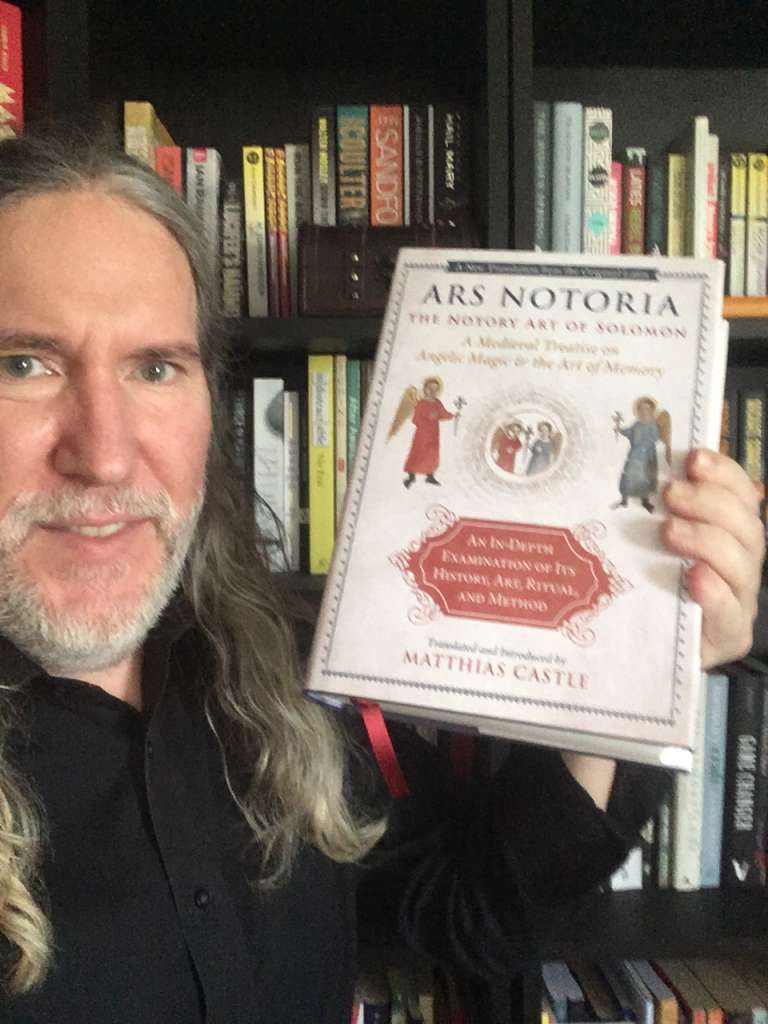Podcast: Download
Subscribe: Apple Podcasts | RSS

The book provides instructions for prayers with memory techniques intended to help the user learn the seven liberal arts and feel more connected to divinity.
Best part? An all new edition of this work has recently appeared. And it’s the best I’ve seen yet.
To discuss his new translation and study of what many people consider the earliest example of angelic magic, Matthias Castle joins me on this episode of the Magnetic Memory Method Podcast.
On this page, I’ll also review this beautiful book. I’ll also discuss how I think it might help you in your journey to memory mastery.
It’s definitely well worth having in your collection for many reasons. One of them is written on the cover of the book itself. This edition truly is an in-depth examination of the history surrounding this book. And Castle’s understanding of how memory techniques work is impeccable.
Although I can’t speak much to the angelic magic aspect of this text, I’ll also share a few considerations you might find useful on that front nonetheless.
Ready?
Listen to the interview with Matthias or watch the discussion via the magic of video.
Who Is Matthias Castle?
As an independent scholar, Matthias Castle focuses on classical studies, the Western esoteric tradition and medieval history.
He’s an incredible researcher and you can learn more by reading his blog. He’s also on Instagram and Twitter.
When reading his examination of the Ars Notoria, you can definitely feel his years of research coming through.
You can get your own copy of this book on the Inner Traditions website. I recommend getting it in print because the book is itself an object of beauty. You will not only avoid the problems of digital amnesia by reading it in print, but enjoy a deeply aesthetic experience.
About the Ars Notoria
The Ars Notoria first came to my attention thanks to people who follow this blog and the Magnetic Memory Method Podcast.
I then heard about the Matthias Castle edition before it was released from Justin Sledge when we recorded a previous Ars Notoria episode about the text.
If I’m understanding it correctly, the promise of the Ars Notoria is fairly straightforward:
By using ritual magic, you can communicate with angels. They will help you learn faster.
Although I don’t personally believe in angels as such, there are reasons to believe that engaging in visualization exercises involved in the Ars Notoria rituals would create positive benefits.
In Castle’s excellent analysis, you’ll learn more about how people thought about and interacted with this text during its long history.
Some of the highlights for me include:
- The goal of living a life of wisdom and virtue
- How magic was defined
- Details on how the figures in the book likely worked as part of a method of loci
- Beliefs about ascending to the divine through this practice (henosis)
- The difference between calling upon the spirits and persuading them, versus coercing and attempting to bind them
- Details about the shorthand note-taking system, Tironian notes
Shapes, Compression & Note Taking
Another aspect that I appreciated in Castle’s analysis in this book involves how the notae appear.
At first glance, it can all seem a bit random. But as Castle demonstrates, there is a small set of shapes that interact with what appears to be shorthand.
I’m not sure, but I wonder the extent to which some of the notae related to Ramon Llull’s memory wheels and ars combinatoria. I would love to see further scholarship on this question, if not implementation by contemporary practitioners of using angelic magic.
Can The Ars Notoria Still Be Used Today?
Quite possibly, yes. And if you wanted to try, this new edition is a fantastic resource for the attempt.
I thought about giving it a try myself, but with my dietary issues, I don’t think I could handle the fasting. There is also a touch of aphantasia that makes using the notae themselves more challenging than a traditional Memory Palace.
It seems to me that having a learning goal would also be essential. That means it would be very interesting to see if someone could reproduce the promised effects for learning the latest, cutting-edge material in topic categories like chemistry, physics and medicine.
In terms of calling upon angels, my recent Internet friend Richard Webster offers instructions for gaining protection from archangels. There is some crossover in what Webster is suggesting and what you find in the Ars Notoria, and it is worth thinking about how these rituals carry forward in our modern age.
John Michael Greer has suggested in books like The Twilight of Pluto that we are returning to a magical age. It certainly seems that way.
I was surprised, for example, when memory champions John Graham and Nelson Dellis both reached out to tell me about their recent experiences with mysticism and remote viewing.
Understanding What’s Really At Stake
My feeling is that the experimentation matters above all. I certainly have found reciting the language found in the rituals interesting and pleasing. With my many experiences using Sanskrit in meditation, I can easily see how medieval students using the Ars Notoria would have improved their concentration.
In other words, spending time in prayer or ritual and focusing on what you want to occur is generally a good thing. And as the Ars Notoria itself says, you can’t rest on the rituals alone. You also need to use the art of memory itself.
That’s where there’s a bit of a perfect circle involved for one simple reason. People with clear minds are much more likely to be able to use memory techniques. This simple fact has been a major focus of my own teaching for many years, especially in The Victorious Mind. Martin Faulks focuses a lot on this topic as well.
It’s also well-known to contemporary scientists that meditation enhances memory. Indeed, there are almost too many concentration meditations you can try, meaning we’re all incredibly blessed.
In sum, I think you are missing out if you don’t know this history or spend at least a little time giving this ancient memory technique a try.
Please enjoy this interview and reading Castle’s edition of the Ars Notoria for yourself!
Related Posts
- Memory Athlete Braden Adams On The Benefits Of Memory Competition
Braden Adams is one of the most impressive memory athletes of recent times. Learn to…
- Surviving PTSD With The Help of Memory Techniques Featuring Nicholas Castle
Nicholas Castle used memory training and memory techniques to help heal his PTSD. Listen to…
- Simon Luisi On Expanding The Major System In Your Memory Castle
Simon Luisi, founder of the Canadian Memory Championships, shares his take on the Major System.…





